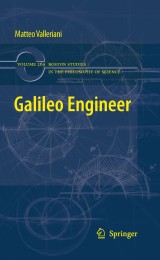Details

Galileo Engineer
Boston Studies in the Philosophy and History of Science, Band 269
|
96,29 € |
|
| Verlag: | Springer |
| Format: | |
| Veröffentl.: | 03.06.2010 |
| ISBN/EAN: | 9789048186457 |
| Sprache: | englisch |
| Anzahl Seiten: | 320 |
Dieses eBook enthält ein Wasserzeichen.
Beschreibungen
Galileo Galilei (1564–1642), his life and his work have been and continue to be the subject of an enormous number of scholarly works. One of the con- quences of this is the proliferation of identities bestowed on this gure of the Italian Renaissance: Galileo the great theoretician, Galileo the keen astronomer, Galileo the genius, Galileo the physicist, Galileo the mathematician, Galileo the solitary thinker, Galileo the founder of modern science, Galileo the heretic, Galileo the courtier, Galileo the early modern Archimedes, Galileo the Aristotelian, Galileo the founder of the Italian scienti c language, Galileo the cosmologist, Galileo the Platonist, Galileo the artist and Galileo the democratic scientist. These may be only a few of the identities that historians of science have associated with Galileo. And now: Galileo the engineer! That Galileo had so many faces, or even identities, seems hardly plausible. But by focusing on his activities as an engineer, historians are able to reassemble Galileo in a single persona, at least as far as his scienti c work is concerned. The impression that Galileo was an ingenious and isolated theoretician derives from his scienti c work being regarded outside the context in which it originated.
War and Practice.- Artist-Engineers’ Apprenticeship and Galileo.- Instruments and Machines.- Galileo’s Private Course on Fortifications.- Practice and Science.- The Knowledge of the Venetian Arsenal.- Pneumatics, the Thermoscope and the New Atomistic Conception of Heat.- The Engineer and The Scientist.- Was Galileo an Engineer?.
<P>This work systematically investigates and reconstructs the practical knowledge Galileo shared during his lifetime.</P>
<P>Galileo shared many aspects of practical knowledge.These included the methods and experience of foremen and engineers active within various frameworks. Galileo did not always react to such scientific impulses in the same way. On the one hand, he not only shared practical knowledge, but also acted as an engineer, especially within the framework of the art of war at the end of the sixteenth century, and more so during the time he spent in Padua. On the other hand, his scientific achievements were largely based on and influenced by aspects of practical knowledge coming from particular disciplines and activities, without him ever becoming an expert in these disciplines.</P>
<P>Two case studies, the first concerned with Galileo's theory of the strength of materials and the second with his achievement of an atomistic heat doctrine, enable a focus onthe early modern model of generation of new scientific knowledge based on the conflicting interaction between aspects of practical knowledge and Aristotelian theoretical assumptions.</P>
<P>Galileo shared many aspects of practical knowledge.These included the methods and experience of foremen and engineers active within various frameworks. Galileo did not always react to such scientific impulses in the same way. On the one hand, he not only shared practical knowledge, but also acted as an engineer, especially within the framework of the art of war at the end of the sixteenth century, and more so during the time he spent in Padua. On the other hand, his scientific achievements were largely based on and influenced by aspects of practical knowledge coming from particular disciplines and activities, without him ever becoming an expert in these disciplines.</P>
<P>Two case studies, the first concerned with Galileo's theory of the strength of materials and the second with his achievement of an atomistic heat doctrine, enable a focus onthe early modern model of generation of new scientific knowledge based on the conflicting interaction between aspects of practical knowledge and Aristotelian theoretical assumptions.</P>
Galileo’s activities as a practitioner: the side of Galileo’s work historians did not relate The practical knowledge shared by Galileo and from which his science emerged All the relevant letters from Galileo’s correspondence that provide an understanding of Galileo as an engineer translated into English for the first time
















